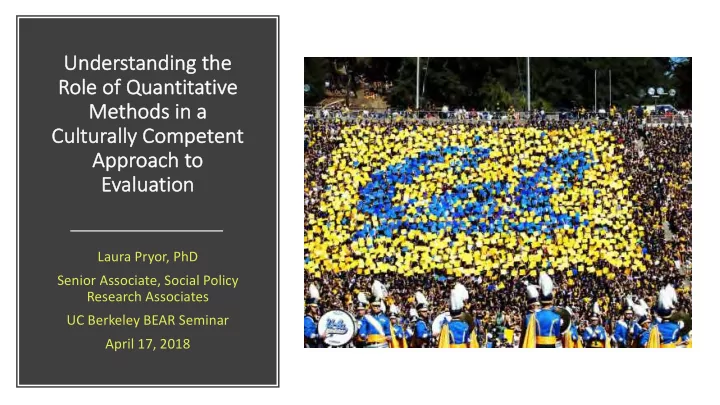

Un Under erstanding g the e Ro Role of Quantitative Me Metho hods ds in n a Cu Culturally Co Competent Approach oach to o Ev Evaluation Laura Pryor, PhD Senior Associate, Social Policy Research Associates UC Berkeley BEAR Seminar April 17, 2018
Part One: Review and Synthesis of Existing Articles using a Culturally Competent Approach a) Motivation b) Description of selected articles c) Challenges with using quantitative measures d) Document strategies for using quantitative measures Presentation Outline Part Two: Case of the UC Berkeley Athletic Study Center Evaluation a) Evaluation case background b) Constructing, validating, calibrating two quantitative measures c) Survey Analysis via the Latent Growth Item Response Model
Part One: Review and Synthesis of Existing Cases
“Without attention to the complexity and multiple determinants of behavior, evaluations can arrive at flawed findings with potentially devastating consequences,” (American Evaluation Association, 2011, p. 2)
Emphasis on Qualitative Methods Problems with Standardized Measures Motivat ivating S ing Study udy: Chouinard & Cousins (2009) – A Review and Synthesis of Current Research on Cross-Cultural Evaluation
Ag Agenda nda f for F Fut utur ure Research: Re Can quantitative approaches help evaluators better engage culture? If so, which (if any) approaches would be consistent with cross- cultural evaluation?
Research Questions 1. To what extent do evaluators using culturally competent approaches incorporate quantitative methods? 2. How do evaluators incorporate quantitative measures in a way that aligns with culturally competent evaluation approaches? 3. When using quantitative methods in evaluation, what are common strategies that align with a culturally competent evaluation approach?
Cultural Competence: A Definition Cultural Competence: ““A stance taken toward culture, not a discrete status or simple mastery of particular knowledge and skills. A culturally competent evaluator is prepared to engage with diverse segments of communities to include cultural and contextual dimensions important to the evaluation,” (American Evaluation Association, 2011, p. 1).
What is a Culturally Competent Ap Approach
Sample & Method 1. Extend Chouinard and Cousins’ original sample to 2016 2. Systematically review and code all studies sampled from 1991-2016
Sample Characteristics
To what extent do evaluators using culturally competent approaches incorporate quantitative methods?
To what extent do evaluators using culturally competent approaches incorporate quantitative methods?
How and for What Purpose ? For what purpose was a quantitative method used? 36 Of the 74 studies using quantitative methods: • Two used t-tests • Two used ANOVA 17 • One used multivariate regression 9 8 • Three used an RCT design 3 Overall Formative Development Knowledge Social Justice summative improvement Generation judgement & learning
How do evaluators incorporate quantitative measures in a way that aligns with culturally competent evaluation approaches? Frequncy of Measure Designs 58% of studies Evaluator 50% -Created (n=64) used a quantitative Adapted 14% measure Existing 36%
Of the studies using quantitative measures, 48% 48% (n=31) described a challenge with using a quantitative measure
Challenge One: Translated instruments lose conceptual meaning
Challenge Two: Funder- mandated instruments are not appropriate for local culture
Challenge Three: Lack of content validity with existing instruments
Challenge Four: Inappropriate data collection methods
Challenge Five: Flawed Items Design
Ag Agenda nda for Fut utur ure Re Research: Can quantitative approaches help evaluators better engage culture? If so, which (if any) approaches would be consistent with cross- cultural evaluation?
When using quantitative methods in evaluation, what are common strategies that align with a culturally competent evaluation approach?
Co Cons nsul ult Pa Participants abou out Ra Random omization on
Use item design features consistent with narrative culture
Use community members or youth to administer quantitative instruments
Disaggregate findings by key subgroups, paying attention to differences between and within groups
1) How, if at all, can measurement and constructing measures help us to further align quantitative methods with a culturally competent approach to evaluation? 2) How, if at all, can advanced statistical modeling help us better engage with and respond to culture?
Recommend
More recommend